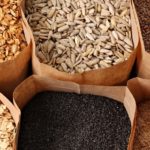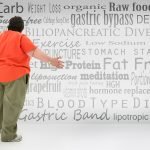It seems logical that people who truly enjoy the taste of food would eat more of it, more often than those who don’t enjoy eating as much — and therefore, they would pile on more pounds. But in fact, new research out of the University of Oregon reveals that obese people tend to get less pleasure from eating than skinny folks do.
A report published in Science magazine describes how researchers studied the brains of 77 women while the women drank chocolate milkshakes. Apparently, the women’s heads were clamped into MRI scanners while the chocolate drink got squirted into their mouths through a straw. It’s hard to imagine how anyone could enjoy anything with their head clamped to machinery, but the scans revealed that some of the women actually did find pleasure in the squirted chocolate — and it was the skinny ones who got the most pleasure — the ones least likely to gain weight over time.
The subjects fell into three groups: thin, obese, and those with a gene variant that makes them less reactive to dopamine, a neurotransmitter that stimulates the brain’s pleasure centers. That pleasure-inhibiting gene variant is relatively common — about 30 percent of the population has it (no wonder so many of us “can’t get no satisfaction”). And those with the gene variant have about 40 percent fewer dopamine receptors in their brains.
Again, if you think that the more people enjoy food, the more they eat of it, then these findings run counter to logic. But as it turn out, you’re half right!
Under normal conditions, dopamine gets released when we eat: the more pleasurable we find the food, the greater the amount of dopamine. The scientists in this study confirmed that after subjects drank the milkshake, those with the gene variant, as well as the obese subjects, had a more limited dopamine response than did the thin women. And a year later, those with the gene variant — who got less pleasure from eating — had gained significantly more weight than those with a normal dopamine response.
So what’s happening here?
In fact, at the outset of the study, scientists predicted that those with the gene variant would put on more weight. (And here’s the rub.) According to researcher Eric Stice, obese people have a more active dopamine response than thin people do before eating, just from thinking about food. But once they eat the food, their dopamine response is actually inhibited. He says, “If you look at the brain response when people are about to get the milkshake, obese individuals show greater activation of the reward circuitry, not less. So, ironically, they expect more reward but seem to experience less.” And because obese people, or those with the gene variant, get more excited thinking about food but less pleasure from actually eating it, they have to eat more than thin people do in order to activate enough dopamine to get the reward that they crave.
As Dr. Stice points out, this is a sure recipe for food addiction — those with the genetic variant suffer a constant craving, and so ever more of the “substance” (rich food) is needed to satisfy it. To intervene in the addiction, Stice says abstinence is the best course, as with any addiction. “Don’t get your body used to eating really high-fat, high-sugar foods, because it’ll be really hard to stop. Eating just a little bit of chocolate every day is not the way to go. It’s better to stop eating chocolate completely and say, ‘That’s the healthy improvement I’m going to make in my diet.’ And after a month or maybe six weeks, your craving for chocolate will finally go down and stay down.”
Well that’s certainly good advice, but the researchers have more in mind — they want to identify people who have the genetic variant early on so they can “intervene and prevent obesity,” says Cara Bohon, a member of the research team. And how will they intervene? As Dr. Stice says, “… identifying changes in behavior or pharmacological options could correct this reward deficit to prevent and treat obesity.”
So there you have it — a new reason to develop a new pharmacological drug and to develop technology for measuring dopamine receptors so that those with the predisposition to overeat finally will have something genetic to blame (and a documented reason to get a prescription). Meanwhile, you might want to try Dr. Stice’s first suggestion — the avoid-the-chocolate-shake approach–and maybe find a healthier way to stimulate your pleasure centers while controlling your appetite.
:hc












According to Doug Kaufmann, what makes bread rise makes people rise. Those with fungal/yeast infections crave sugar because fungus demands it, needs it to live. When you starve and kill fungus using his phase one diet, antifungals, fiber, maybe a good probiotic, a comprehensive vitamin/mineral/amino acid formula. one can’t help but lose weight, gene variant or no gene variant. That’s weight loss according to Doug. I cannot attest to his philosophy personally, but it is intriguing, I do want to give it a whirl.
Perhaps dopamine is suppressed because fungal toxins inhibit it.
Another side affect laden drug? Oh goody, that’s just what we need.
This study is very interesting considering I never thought that more overweight people would not enjoy eating as much as skinnier healthier people. However after reading this I realized that if I was overweight I would probably stress over something like a milkshake because I would know that it would further my already unfortunate position.
Has this study experimented with health foods? Something tasty, even fruit for example? Maybe people who struggle with their weight would feel better about eating a food that would not be detrimental to their health? Skinnier people could react differently as well, possibly not exhibiting a response so favorable. If the skinnier women knew that they would have little/no consequences for indulging in a chocolate milkshake then maybe they would not want to eat something healthy that they don’t necessarily need to maintain their state?
I find this study absolutely
I find this study absolutely relevant to me. I am obese, with suspected ADHD. I don’t have regular meal times, and I tend to overeat. Sometimes I do wonder why do I even eat when the food doesn’t taste that nice. How I wished I could stop eating, but it’s all on impulse. When I finally realized it the damaged has already been done.